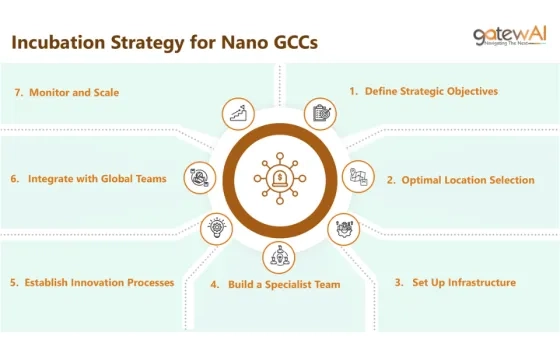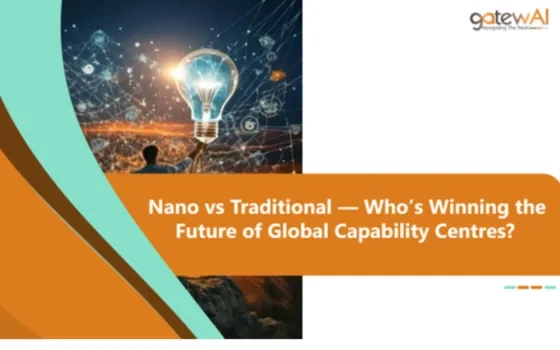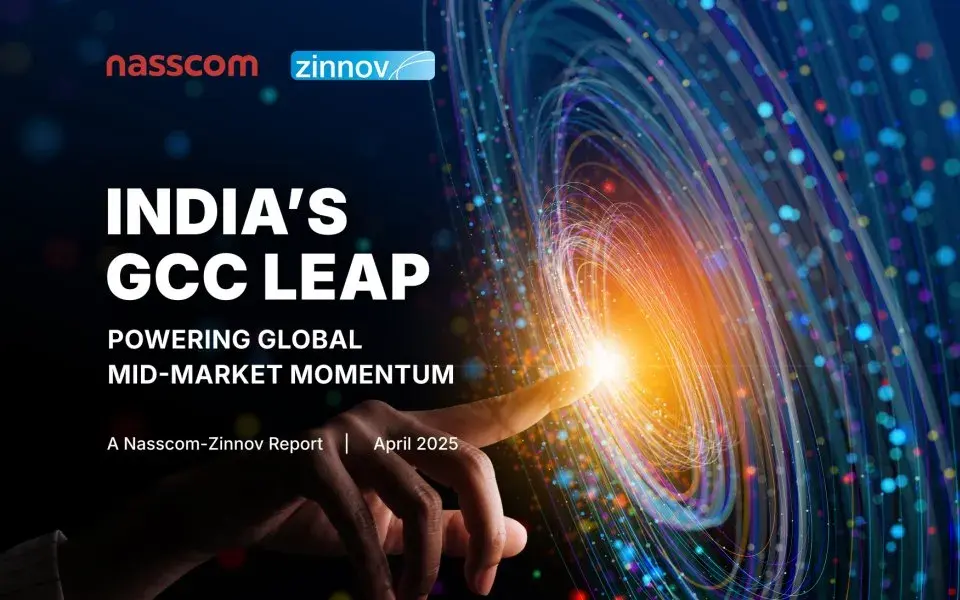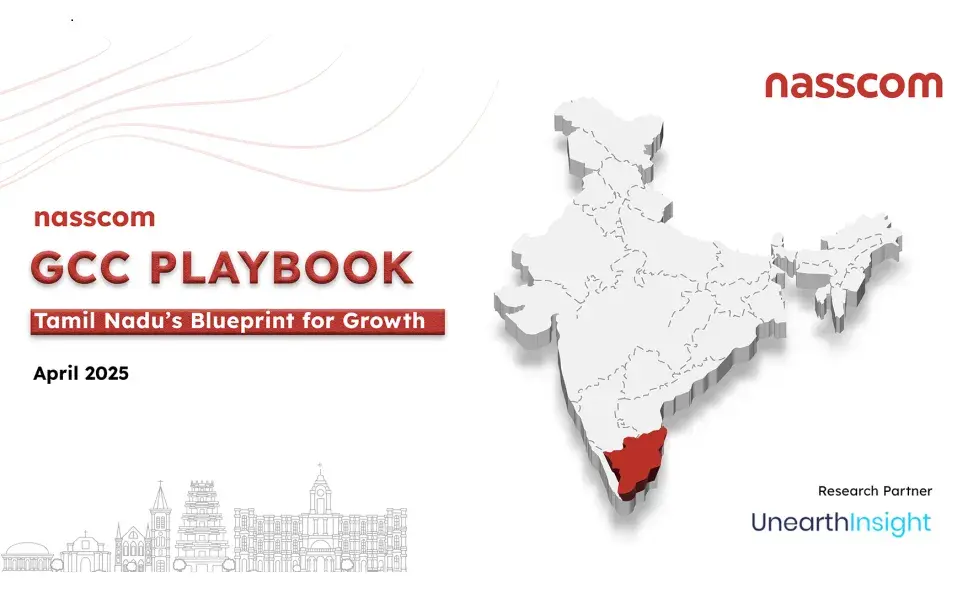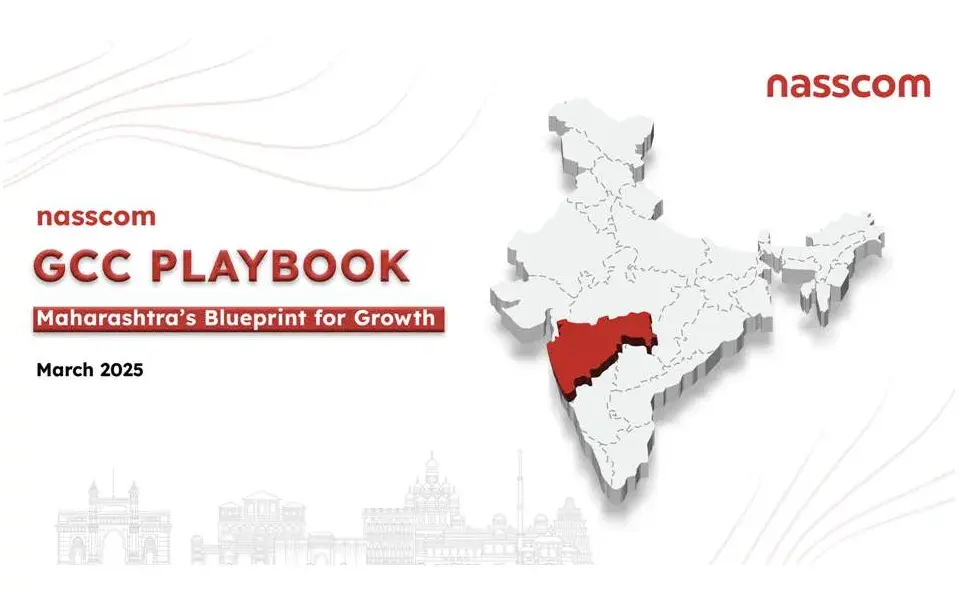Innovation Hub
Global Capability Centers (GCC) are gaining momentum and their market size is growing year by year. Vast Talent pool and operational efficiency drive GCCs to India. To stay ahead, GCCs should focus on innovation, talent development and collaboration. Technology partners focus in collaborating with start ups and research institutes to build the innovation ecosystem.
They can significantly enhance the value of Global Capability Centers (GCCs) by fostering innovation, accelerating digital transformation, and providing access to cutting-edge technologies and expertise.
Third-party innovation hubs provide GCCs with the tools, resources, and networks necessary to drive innovation, enhance operational efficiency, and stay competitive in a rapidly evolving global market. Through collaboration with these hubs, GCCs can achieve faster, more cost-effective, and lower-risk innovation outcomes.
Successful collaboration programs have a high degree of customization, with clearly defined objectives and talent allocation to drive tangible and impact driven business outcomes. Here’s how third-party innovation hubs can add value to GCCs:
Research centers: Collaborates with academic institutes for joint IP creation and open research,
Co-innovate: Facilitate Start-ups and GCCs collaborate to co-create new solutions & capabilities
Platform Providers: Access to GCCs platforms to start-ups for innovation
License or Vendor Agreement: Enter into a license agreement with GCCs and start-ups to create solutions
Acquisition: Facilitate GCCs acquire start ups for their capability and talent pool
Technology value and third party service providers
Technology collaboration allows GCCs to focus on their core competencies while leveraging the expertise and resources of service providers to drive growth and competitive advantage. By collaborating with third-party service providers, GCCs can enhance their technology value through access to advanced capabilities, cost efficiencies, and strategic innovations. Few values are mentioned here -
- Scalability and Flexibility
- On-Demand Resources: Service providers offer scalable solutions, allowing GCCs to quickly ramp up or down their technology capabilities based on business needs, without the overhead of permanent investments.
- Flexible Engagement Models: Providers often offer flexible engagement models, such as managed services or pay-as-you-go, enabling GCCs to optimize costs and resources.
- Expertise and Specialized Skills
- Domain Expertise: Service providers bring deep expertise in specific technologies or industries, offering insights and solutions that GCCs might not have in-house.
- Skill Augmentation: They can supplement the GCC’s team with specialized skills, such as cybersecurity, cloud architecture, or data science, which might be difficult to maintain internally.
- Accelerated Innovation
- Rapid Prototyping and Development: Providers can help GCCs rapidly prototype and develop new solutions, speeding up time to market for new products or services.
- Innovation Labs and Co-Creation: Many providers offer innovation labs or co-creation spaces where GCCs can collaborate on innovative projects, benefiting from the provider's resources and expertise.
- Cost Optimization
- Efficiency Gains: By leveraging automation, AI, and process optimization, service providers can help GCCs reduce operational costs and improve efficiency.
- Outsourcing Non-Core Functions: Providers can take over non-core IT functions, allowing GCCs to focus on strategic initiatives while reducing the cost and complexity of managing those functions internally.
- Access to Advanced Technologies
- Cutting-Edge Solutions: Service providers access to the latest technologies and tools, which GCCs can leverage without needing to invest heavily in R&D.
- Emerging Technology Integration: Providers can help GCCs integrate emerging technologies like AI, IoT, blockchain, and 5G, enabling them to stay ahead of the curve.
- Improved Operational Efficiency
- Automation and RPA: Service providers can implement robotic process automation (RPA) and other automation tools to streamline repetitive tasks, improving efficiency and reducing errors.
- Optimized IT Operations: Providers can manage IT operations more effectively through AIOps (Artificial Intelligence for IT Operations), predictive analytics, and proactive monitoring, leading to fewer disruptions and faster issue resolution.
- Global Reach and Local Expertise
- Localized Support: Providers with a global presence can offer localized expertise, ensuring that GCCs can navigate regional market conditions, regulatory environments, and cultural nuances.
- Global Best Practices: They can bring best practices from other regions and industries, enabling GCCs to adopt proven strategies and technologies.
- Faster Digital Transformation
- Strategic Digital Roadmaps: Service providers can assist in creating and executing digital transformation roadmaps that align with the GCC’s goals, driving faster adoption of digital technologies.
- Change Management: Providers can support the cultural and organizational changes required for successful digital transformation, helping to minimize resistance and ensure a smooth transition.
- Enhanced Customer and Employee Experiences
- CX and EX Solutions: Providers can help GCCs implement customer experience (CX) and employee experience (EX) solutions, such as CRM systems, chatbots, and employee portals, that improve engagement and satisfaction.
- Personalization and Automation: Leveraging AI and automation, providers can help GCCs deliver personalized experiences to customers and employees, improving loyalty and productivity.
- Data Analytics and Insights
- Advanced Analytics: Providers can offer sophisticated data analytics services, helping GCCs derive actionable insights from big data, improve decision-making, and drive business outcomes.
- AI and ML Integration: They can integrate AI and machine learning models to enhance predictive analytics, optimize operations, and personalize customer experiences
Technology offerings from third party service providers
Global Capability Centers (GCCs) can collaborate with service providers across a wide range of technological areas to enhance their capabilities, drive innovation, and optimize operations. Here are some key technological areas where such collaboration can be valuable
- Low-Code/No-Code Development
- Rapid Application Development: Collaborating on low-code/no-code platforms to enable faster development of business applications and reduce dependency on traditional coding.
- Citizen Development: Empowering non-technical users within the GCC to develop and deploy applications, improving agility and responsiveness.
- Artificial Intelligence and Machine Learning (AI/ML)
- AI/ML Model Development: Partnering with providers to develop, train, and deploy AI/ML models for predictive analytics, automation, and enhanced decision-making.
- Data Science and Analytics:** Leveraging data science expertise to extract insights from large datasets, enabling data-driven strategies and operations.
- Robotic Process Automation (RPA)
- Process Automation: Collaborating on the implementation of RPA to automate repetitive tasks, improve efficiency, and reduce operational costs.
- Intelligent Automation: Combining RPA with AI/ML to create intelligent automation solutions that can handle more complex processes.
- DevOps and Agile Transformation
- CI/CD Pipelines: Service providers can help in setting up continuous integration and continuous deployment (CI/CD) pipelines, enabling faster and more reliable software delivery.
- Agile Coaching and Transformation: Facilitating Agile adoption and transformation within GCCs, improving collaboration, and accelerating product development.
- Digital Transformation
- Digital Strategy and Roadmap: Collaborating on developing and executing digital transformation strategies that align with business goals.
- Customer Experience (CX) Solutions: Enhancing digital customer experiences through the implementation of omnichannel platforms, customer analytics, and personalized services.
- Cloud Computing and Infrastructure
- Cloud Migration and Management: Service providers can assist GCCs in migrating to cloud platforms (AWS, Azure, Google Cloud), managing cloud infrastructure, and optimizing cloud costs.
- Hybrid and Multi-Cloud Strategies: Collaboration on building and managing hybrid or multi-cloud environments to ensure flexibility, scalability, and resilience.
- Cybersecurity
- Threat Detection and Response: Service providers can offer advanced cybersecurity services, including threat detection, incident response, and vulnerability management.
- Identity and Access Management (IAM): Implementing robust IAM solutions and ensuring compliance with global security standards.
- Data Management and Big Data
- Data Warehousing and Management: Implementing and managing data warehouses, data lakes, and other big data solutions to handle large volumes of structured and unstructured data.
- Data Governance and Compliance: Ensuring proper data governance, data quality, and compliance with data protection regulations like GDPR or CCPA.
- Internet of Things (IoT)
- IoT Platforms and Solutions: Developing and deploying IoT solutions for monitoring, analytics, and automation in various sectors such as manufacturing, healthcare, and logistics.
- Edge Computing: Implementing edge computing to process data closer to the source, reducing latency, and improving real-time decision-making.
- Sustainability and Green IT
- Energy-Efficient Technologies: Collaborating on implementing energy-efficient IT solutions, such as green data centers and sustainable cloud computing, to reduce the GCC’s carbon footprint.
- Sustainable Supply Chains: Utilizing technology to monitor and improve the sustainability of supply chains, ensuring alignment with corporate social responsibility (CSR) goals.
Service providers can play a key role in GCCs stay competitive, improve operational efficiency, and drive innovation, all while reducing costs and mitigating risks.










